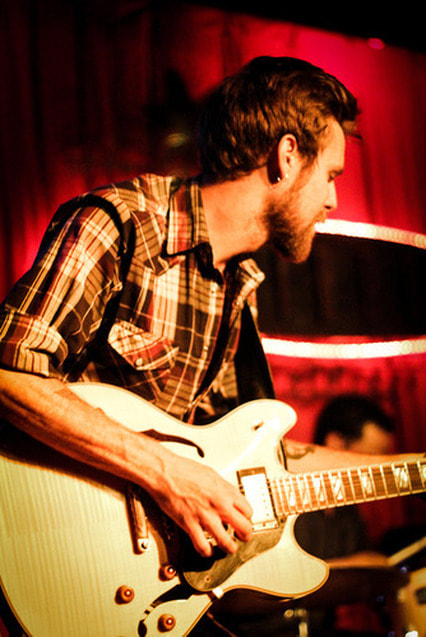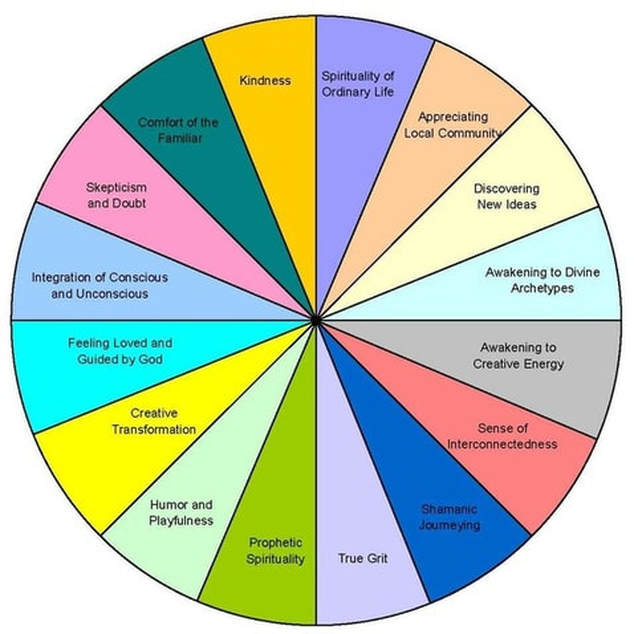Philosophy from the Guitar
an interview with Chris Mosley of the Grizzly Adams Family
the guitar is your teacher, and so is the
activity of playing with other people.
Jay McDaniel: Do you think there is truth in music?
Chris Mosley: Yes, I think music can resonate with the natural order of things.
JMcD: Some people limit truth to visual experience. They speak of seeing the truth and gaining insight. But you seem to find truth in auditory experience. Is it alright if we say that music can ring true and sound the depths of things?
CM: Yes. This is what I hear in the overtone series. The vibrating string is a clear example of the natural order of things. The fundamental (the root) creates an endless subdivision of itself and these subdivisions give us what we consider nice sounding harmonies. Over thousands of years humans have kept using more and more of the available overtones in specific arrangements. This is language, and when the tones are in tune, it's truth.
I would also add that I don't have a strong line between sonic and visual experience. This is something that seems to have been a bit of an advantage for me in the process of studying music because I basically see it in shapes and colors in my mind, making it easier to memorize and conceptualize things. The overtone series makes just as much sense visually as it does sonically, and is interrelated with the golden ratio, which has been utilized extensively in visual art.
JMcD: In an earlier discussion you told me that, for you, different kinds of music ring true in different ways. Some ring true through their harmonies, you said. But some ring true through their melodies, or their rhythmic qualities, or, in the case of music with words, their lyrics. You also said that music can ring true and sound the depths with its soulfulness. In that conversation you said that some music could be very sophisticated harmonically or melodically or rhythmically, but lack soulfulness. And that some can lack sophistication in these levels, but still have greater soulfulness. Do you still think this is true? Would you say a word about it?
CM: I think 'soulfulness' takes us back to the use of language. As an artist you have to do two main things: gain control of your medium and then really use it as a Medium, meaning something that bridges a gap. Any language, be it literature or music or dance, is used in an artistic setting to reveal a part of the artist's soul. So I guess I would say that 'soulfulness' as I now see it, is when somebody gets in touch with themselves and then develops an honest way of showing it to the audience. 'Showing' being the operative word. 'Telling' is not the kind of language we're talking about.
JMcD: In your own development as a musician, have there been times when one or another of these qualities was, for you, more important? For example, did you ever think that instrumental music was for some reason better or more pure than, say, music with lyrics?
CM: I have definitely gone through different phases of focus. When I began playing at age 11, I was very interested in writing songs with lyrics, which I did a lot of early on. As I began to understand the inner workings of music, I started to get bored with folk songs and much more interested in jazz. So I went down that rabbit hole only to find another rabbit hole that people didn't talk about much, being microtonality and Just Intonation, so I went down that for a while. It's an amazing, endless thing to work with but after a good stretch of obsession I got a bit exhausted. As I came out of that phase I started writing songs again and working on my voice. I felt like I had something to write about, so I did. These days I have a pretty good balance of running the Grizzly Adams Family with my original stuff and gigging a few nights a week in jazz trios and quartets.
JMcD: I am curious about soulfulness? Some people say that soulfulness can only come to a person after a bit of pain, or maybe even a lot of it. Do you think this is true? Or do you think that joy can as easily give rise to it? What is your experience?
CM: I recently read a quote somewhere that went, "Soul is in the stories". I think a good story usually has some pain in it, but saying that soulfulness comes from pain might be an overstatement. I think good art absolutely has to deal with pain to be relevant though... It's probably the most universal experience there is.
JMcD: A little more on soulfulness. Can it be enriched by other people? Can a person become more soulful with help from friends? For example, can playing music with other people help a person become more soulful?
CM: For me, playing with other people is essential. The interaction between musicians is a beautiful thing, and it's a big part of the drive to become a substantial musician capable of real communication. If playing music with other people doesn't make you more soulful then maybe you shouldn't really play music.
If I've been playing with someone for a number of years, there is a reason for that, and when I say, "I love you", I mean it. Not being an especially social person, there is no way I would have the depth of friendship that I have with so many people without having spent hours and hours of performing and wordlessly communicating with them.
JMcD: It sounds like playing with friends has contributed to strength of beauty in your soul. I borrow the phrase from the philosopher Alfred North Whitehead. In this website I've tried to illustrate what he means with help from a photographer, Maxine Payne. You will get a sense of it in Strength of Beauty. Also, one of our influential columnists, Patricia Adams Farmer, has written an essay called "What is Fat Soul Philosophy?" In that essay she quotes the philosopher Bernard Loomer who talks about the Size of a soul. I'm including the quotation in the right-hand column, and also a diagram.
You'll note that one aspect of a "fat soul" is capacity for loving relationships. It sounds like playing the guitar with others has really helped you here. And I imagine that, as you play with others, you also grow in a tolerance for enriching tensions. Part of this growth depends on others; they become your mentors in spiritual growth. But part of it depends on you and your own capacities for letting go. Has there been much of this in you?
CM: In my experience there is no way to perform music without confronting a massive amount of ego and the fear that comes with it. A musician is forced to deal with the ego/fear problem head on and will not progress past a certain point without a kind of resolution within him/herself. It seems to me that mastery and humility are very intertwined because mastery cannot be attained without years of practicing humility.
JMcD: For some people the idea of practicing humility is a contradiction in terms, because humility is a relinquishment of ego but practicing is an act of the will, and so often the "will" is ego-driven. But many wise spiritual teachers distinguish between willfulness and willingness. Willfulness is the ego-driven will; willingness is an active cooperation with something or someone more than you.
I know that friends have invited you into a more willing approach to life. I am wondering if, for you, the guitar has also invited willingness. Almost like a spiritual friend or teacher? In many spiritual traditions, instruments can be teachers for those who are willing to submit to their callings. Has the guitar been this for you?
CM: I don't think that practicing humility is a contradiction in terms. To me it's just an essential aspect of being a musician, which means it's part of what you practice. In the jazz world there is a very functional way of dealing with this, which is called 'cutting'. If you step onto the bandstand and can't hang, you get cut in front of everybody. You have to deal with that and then come back and get cut again, and again until you've got it together. This is a slightly gruesome, yet important part of a jazz musician's path. Sometimes you'll come across a player who is pretty good in a lot of ways but you can tell he hasn't been cut. A lack of humility is a very bad sign in a player, and basically establishes a ceiling on their development. Any musician who has not dealt with the fact that music itself is much, much bigger than them is confined to their own little prison. You can often identify these folks on the first handshake.
The guitar has most definitely been like a guide to me. The one thing that can always be gone back to.
JMcD: The diagram below illustrates some of the "spiritual moods" that are communicated and evoked by music and other arts. As I see things, each one reveals a truth about the universe. As I listen to some of your songs, I often hear some of these moods. Sometimes I hear humor, sometimes a sense of connectedness, sometimes skepticism and doubt, sometimes an awakening to divine archetypes or patterns, sometimes an awakening to creative energy. Always I hear a discovery of new ideas. Often they all flow together. When you think about your own work, are any of these moods especially important to you?
CM: Yes, those.

